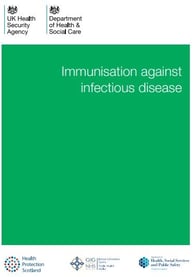Other useful links and further reading:
Tick surveillance scheme. Send off your ticks!!!! YES IT IS A POTENTIAL RISK IN THE UK!! Help the authorites to track down those ticks and see what they are carrying
Dec 2024- a case of TBE in Italy: Trentino, tick bitten: 57-year-old dies after two months of agony
Recent Updates & News
10th May 2025: 10 cases of tick-borne encephalitis recorded in Lithuania this year (you can translate if required)
Not a lot to tell you about here at the point of creation of the portal (June 2024). GB last updated over ten years ago. Guess this one is just 'ticking' along nicely... (*GROAN*)
HOWEVER, Keep an eye on wording updates if the Green Book chapter is reviewed:
TBE HAS popped up in JCVI minutes (see Oct 23) as a subject for discussion. Vaccination is currently advised in specific groups through travel or employment, but is currently only applied for those going abroad rather than those employed in the UK. The vaccine is not available through the NHS and can only be obtained through travel clinics. They discussed concerns about accessibility and inconsistencies in availability for people at occupational risk, such as tick ecologists or deer cullers, working in the UK.
Why the worry about the UK? Well, there have been 4 probable/confirmed human cases of TBE in the UK since 2019. Eco-epidemiological studies suggested an evolving risk of UK TBE with tick and deer sero-surveillance studies indicating that certain parts of the UK have a risk profile similar to the TBE affected areas of Europe! In addition, climate and land use changes, as well as greater human exposure increases relative risk of TBE. JCVI postulated that the guidance in the Green Book needs a little more clarity about applying the advice to the UK context, not just for travel (with respect for occupational risk, but less so for recreational risk). Interesting observation: Ironically TBE is considered a 'travel vaccine' recommended for the UK if you are having a consult in America! The committee agreed that there was a need to raise awareness among clinicians for testing, and that the GB wording could be adjusted, and that accessibility to vaccination for those at risk in the UK context also should be improved. Watch this space I guess!


Bits and bobs to casually drop into conversation
Did you know....
TBE occurs in most or parts of Austria, Germany, southern and central Sweden, France (Alsace region), Switzerland, Norway, Denmark, Poland, Croatia, Albania, the Baltic states (Estonia, Latvia and Lithuania), the Czech and Slovak Republics, Hungary, Russia (including Siberia), Ukraine, some other countries of the former Soviet Union, and northern and eastern regions of China.
There are three forms of the disease related to the virus subtypes. These are: European, Far Eastern, and Siberian.
The case fatality rate of the European form is 1%. Long-lasting or permanent neuropsychiatric sequelae are observed in 10–20% of affected people. The Far Eastern version is more gradual in onset and normally takes a more severe and longer course with a reported mortality of 5–20%.
TBE is transmitted to humans by the bite of an infected tick (as one might imagine from the name) BUT ALSO, less commonly, by ingestion of unpasteurised milk from infected animals, especially goats. The virus is maintained in nature by small mammals, domestic livestock and certain species of birds.
More men tend to be infected than women and most of these infections are caused by leisure activity such as hiking.
The incidence peaks in spring and early summer, but can occur throughout the year.
It might be rare to use the vaccine in the UK but there is widespread use of TBE vaccine in European countries. Check out Austria, for instance, on the ECDC vaccine scheduler and compare with travel recommendations on Travel Health pro. Do many people show up for travel health consults for Austria? Likely not...
Awareness of risk areas is essential. The following measures are advised in the Green Book chapter whether or not vaccine is given: Some protection against TBE is provided by covering arms, legs and ankles, and using insect repellents on socks and outer clothes. Any ticks attaching to the skin should be removed completely as soon as possible (evidence suggests that the best method is slow, straight removal with tweezers- see this Tick-Aware Toolkit for more info (p8) which was published in April 2023). Unvaccinated individuals bitten by ticks in endemic areas should seek local medical advice. Unpasteurised milk should not be consumed. The vaccine is recommended particularly for spring and summer travel in warm, forested parts of the endemic areas, where ticks are most prevalent. Individuals who hike, camp, hunt and undertake fieldwork in endemic forested areas should be vaccinated along with those who will be going to reside in an area where TBE is endemic or epidemic, and particularly for those working in forestry, woodcutting, farming and the military.










